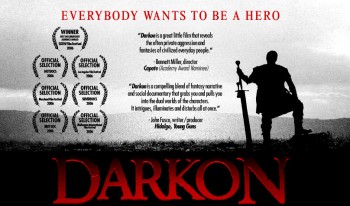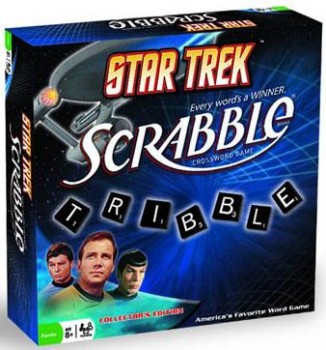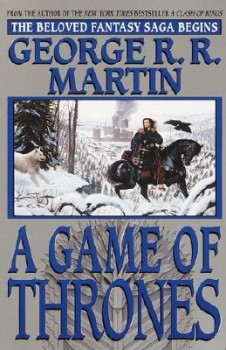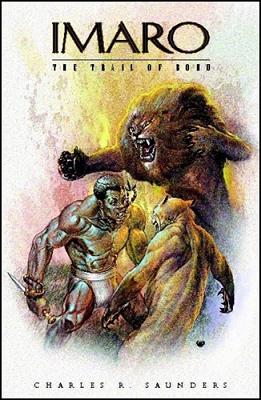Darkon
 As a follow-up to last week’s post on Escapism, I give you Darkon (2006), a low-budget documentary by Andrew Neel and Luke Meyer that raises some of the same questions I did in my post as it looks at one particular group of LARPers (Live-Action Role-Players) involved in a game that has become its own little reality. Following the lives of a few key players in the drama, the documentary (which I watched free on Hulu after John Ottinger pointed it out, though it is also available from snag films) chronicles their in-game and out-of-game struggles, and how these facets of their lives intertwine.
As a follow-up to last week’s post on Escapism, I give you Darkon (2006), a low-budget documentary by Andrew Neel and Luke Meyer that raises some of the same questions I did in my post as it looks at one particular group of LARPers (Live-Action Role-Players) involved in a game that has become its own little reality. Following the lives of a few key players in the drama, the documentary (which I watched free on Hulu after John Ottinger pointed it out, though it is also available from snag films) chronicles their in-game and out-of-game struggles, and how these facets of their lives intertwine.
If your initial reaction to adults pelting each other with foam swords is to roll your eyes, that’s probably even more reason to watch this documentary, which is a sympathetic and nuanced look at the lives of these players. Firstly, the film is presented as a real struggle for ‘in-game power’ between its two central characters, leaders of rival ‘countries.’ These competing factions of Darkon chart their progress in wars that allow them to expand across a map, and one faction, the nakedly imperialistic Mordom, has had more success at this than the rest. Feeling threatened, other countries lead by Laconia, band together to fight them.
 I’ve only ever heard the terms ‘escapism’ and ‘escapist’ used as pejoratives and, quite often, used to describe things that I enjoy. We all know what these terms mean, and especially what they are implicitly communicating: the notion that escapist entertainment is a crutch, a way of running away from reality. But also, and I think that this is more important, that it has no redeeming value as art or as educational material.
I’ve only ever heard the terms ‘escapism’ and ‘escapist’ used as pejoratives and, quite often, used to describe things that I enjoy. We all know what these terms mean, and especially what they are implicitly communicating: the notion that escapist entertainment is a crutch, a way of running away from reality. But also, and I think that this is more important, that it has no redeeming value as art or as educational material. Recently I had occasion to visit the toy store — a rarity in a life spent avoiding children as much as possible — and was sort of blown away by how different it was than I remembered. The last time I was in a toy store was probably as a pre-teen buying Advanced Dungeons & Dragons books (yes, unbelievable as it seems, Fiend Folio and Unearthed Arcana used to share self space with Teddy Ruckspin and Cabbage Patch Kids at the local Toys ‘R Us) and, while I wasn’t surprised to see a complete lack of anything RPG in my visit, what did impress me is just how much fantasy and scifi oriented material I did find — you might even say the place was a juvenile spec fic warehouse, though with a side order of dinosaurs, pirates, and the occasional pony.
Recently I had occasion to visit the toy store — a rarity in a life spent avoiding children as much as possible — and was sort of blown away by how different it was than I remembered. The last time I was in a toy store was probably as a pre-teen buying Advanced Dungeons & Dragons books (yes, unbelievable as it seems, Fiend Folio and Unearthed Arcana used to share self space with Teddy Ruckspin and Cabbage Patch Kids at the local Toys ‘R Us) and, while I wasn’t surprised to see a complete lack of anything RPG in my visit, what did impress me is just how much fantasy and scifi oriented material I did find — you might even say the place was a juvenile spec fic warehouse, though with a side order of dinosaurs, pirates, and the occasional pony. Reading James’ post on Wednesday about the fan angst surrounding George R. R. Martin’s A Song of Ice and Fire series (and some of the unnecessarily blunt backlash), I started thinking about just how much I know about this hugely popular saga which I have actually never read. Indeed, having not even read it, I can say I am predisposed to already like it but, as Dave commented on James post, I’m also one of those people who tends not to buy into series with no end in sight.
Reading James’ post on Wednesday about the fan angst surrounding George R. R. Martin’s A Song of Ice and Fire series (and some of the unnecessarily blunt backlash), I started thinking about just how much I know about this hugely popular saga which I have actually never read. Indeed, having not even read it, I can say I am predisposed to already like it but, as Dave commented on James post, I’m also one of those people who tends not to buy into series with no end in sight. Imaro: The Trail of Bohu
Imaro: The Trail of Bohu In brainstorming topics for my ‘getting back on the horse’ return post here at Black Gate after my absence of a few months — I’ve come up with a few mildly interesting ideas. Firstly, I thought about looking at the nature of escapism, how it shouldn’t have the unfair pejorative connotation it does, and how it certainly isn’t limited to works of prose or film or video games designed solely to entertain. Then too I was considering a weird phenomenon I’ve only really just been made conscious of, that of how utterly mainstream fantasy, or, let’s say ‘the fantastic,’ has become just in the last few decades — and I mean aside from the obvious stuff like the popularity of fantasy and science fiction books and movies, but everything from television commercials and product packaging to childrens’ toys and popular expressions bear out the reality that the once distant worlds of speculative fiction are now familiar place names in the cultural atlas of modern life.
In brainstorming topics for my ‘getting back on the horse’ return post here at Black Gate after my absence of a few months — I’ve come up with a few mildly interesting ideas. Firstly, I thought about looking at the nature of escapism, how it shouldn’t have the unfair pejorative connotation it does, and how it certainly isn’t limited to works of prose or film or video games designed solely to entertain. Then too I was considering a weird phenomenon I’ve only really just been made conscious of, that of how utterly mainstream fantasy, or, let’s say ‘the fantastic,’ has become just in the last few decades — and I mean aside from the obvious stuff like the popularity of fantasy and science fiction books and movies, but everything from television commercials and product packaging to childrens’ toys and popular expressions bear out the reality that the once distant worlds of speculative fiction are now familiar place names in the cultural atlas of modern life. Lately I’ve been immersed in all things bibliophilic, reflecting on reading more, organizing my shelves, the value of keeping a list, and the costs associated with an obsession with books. And it occurred to me in the midst of all this that there was something else I could talk about that most of us take for granted, a semi-invisible and rather elementary facet of the reading life that is none-the-less worthy of our occasional attention. Bookmarks.
Lately I’ve been immersed in all things bibliophilic, reflecting on reading more, organizing my shelves, the value of keeping a list, and the costs associated with an obsession with books. And it occurred to me in the midst of all this that there was something else I could talk about that most of us take for granted, a semi-invisible and rather elementary facet of the reading life that is none-the-less worthy of our occasional attention. Bookmarks. I don’t consider myself a fast reader, though I must be someone’s definition of fast. I started reading early, and was always something of a bookworm as a child, but I was never one of those kids who could sit down a read a whole novel in a few hours. In other words, I don’t have any special powers or prodigy-level talents, and what reading speed I have managed to develop has only really emerged later in life, and only with effort.
I don’t consider myself a fast reader, though I must be someone’s definition of fast. I started reading early, and was always something of a bookworm as a child, but I was never one of those kids who could sit down a read a whole novel in a few hours. In other words, I don’t have any special powers or prodigy-level talents, and what reading speed I have managed to develop has only really emerged later in life, and only with effort.  Surprised by the dust on all those books you ‘just bought’ but haven’t gotten to yet? To-be-read pile threatening to topple and crush you under its weight? Tired of being left out of conversations about authors you haven’t read yet? Me too. All of this is common enough for any bibliophile, to varying degrees or another, and its nice that we can commiserate. That is, most of us can, but not all of us, for there is a strange breed that lives among us with the book-lover’s equivalent of superpowers — the hyperspeed reader.
Surprised by the dust on all those books you ‘just bought’ but haven’t gotten to yet? To-be-read pile threatening to topple and crush you under its weight? Tired of being left out of conversations about authors you haven’t read yet? Me too. All of this is common enough for any bibliophile, to varying degrees or another, and its nice that we can commiserate. That is, most of us can, but not all of us, for there is a strange breed that lives among us with the book-lover’s equivalent of superpowers — the hyperspeed reader. I’m not what you’d call a comics guy — I don’t have a set of first editions in acid-free bags in the closet, I couldn’t tell you who the Fantastic Four are, or even distinguish between Marvel and DC (though I’m pretty sure Spiderman is in one camp, and Batman in the other). But I’ve always liked and respected the medium, and the rise of the graphic novel has made sampling the best of what comics has to offer convenient for casual fans like me. So, when I spotted a recommendation in an online forum for Planet Hulk, a graphic novel in which the big green superhero takes on the role of John Carter in a sword and planet epic, I was intrigued, and made an impulse purchase. I’m glad I did.
I’m not what you’d call a comics guy — I don’t have a set of first editions in acid-free bags in the closet, I couldn’t tell you who the Fantastic Four are, or even distinguish between Marvel and DC (though I’m pretty sure Spiderman is in one camp, and Batman in the other). But I’ve always liked and respected the medium, and the rise of the graphic novel has made sampling the best of what comics has to offer convenient for casual fans like me. So, when I spotted a recommendation in an online forum for Planet Hulk, a graphic novel in which the big green superhero takes on the role of John Carter in a sword and planet epic, I was intrigued, and made an impulse purchase. I’m glad I did.